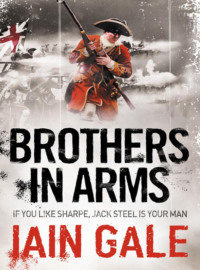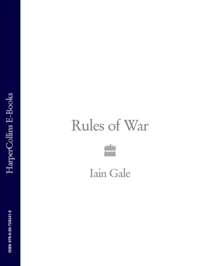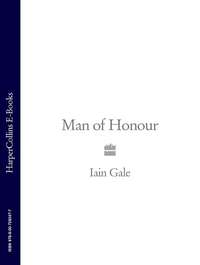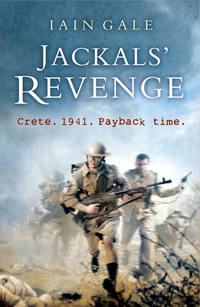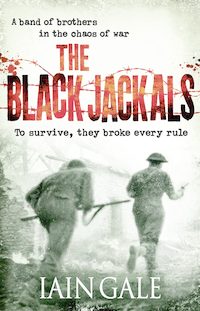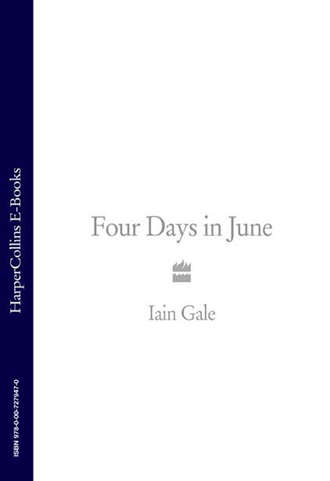
Полная версия
Four Days in June

IAIN GALE
four days in june
A battle lost, a battle won, June 1815
To the memory of George Gale and Giles Gordon
CONTENTS
Prologue A hundred days Day One Thursday 15 June 1815 Day Two Friday 16 June 1815 Day Three Saturday 17 June 1815 Day Four Sunday 18 June 1815 Postscript Biographical Notes Author’s NotePROLOGUE
A hundred days
They had thought him broken. Believed that they had vanquished forever the tyrant who had laid Europe waste for two decades. But he had proved them wrong. Had, in an unguarded moment of that first spring of peace, slipped the bonds of his captivity and returned to France. Had raised again the eagles and the empire and readied himself for battle.
So now the redcoats waited and watched and guessed how he would come to them. The generals, the captains and the men. Men who had thought their soldiering days were past. Who, depending on their rank, had seen their futures now lived out in riding to hounds or gambling in St James’s or spending hard-earned booty in the taverns and whorehouses of Liverpool and London. Men from the shires and men from the hard north. Highlanders and farmers’ boys and thieves and petty felons. Soldiers all.
Men who had fought this irksome man through eight long years in Spain. And with them now the new blood. Callow privates and pale young subalterns, drawn by the promise of an unexpected last chance to find glory and fortune in Boney’s wars. Others came to swell their ranks: Germans, Dutch and Belgians, and on their flank a huge army of Prussians, all of them equally determined to finish now a job they had thought long done.
Together they waited and they watched. And the summer grew strange and unsettling, the days drifting between hot sunshine and heavy rain. In the fields the rye and wheat, still green in ear, stood shoulder high. And the redcoats and all their allies grew restless and longed for him to come.
ONE
Charleroi, 3.30 a.m. Ziethen
The man was terrified. Ziethen was not surprised. The only penalty for desertion was death, and he had gambled his all on making a desperate rush through both his own lines and the enemy pickets. By some miracle he had not been shot. To risk death; to betray your country. It was a strange courage. A courage born of cowardice. He did not look like a coward, this Frenchman. And he did not look like a hero. Or for that matter much like a soldier. On his head was the familiar black shako, with its brass plate bearing the raised number 13. The 13th Regiment of Line Infantry. Ziethen tried to place it. Which corps? Which brigade? Who was facing him down there across the river? No matter. They would get that from him later. He remembered the 13th, though. As heroes – of Austerlitz, Eylau, Wagram, Borodino. He had even crossed swords with them himself – at Auerstadt. But this man was not the Frenchman of 1806. The French who had marched into Berlin a month later, to Prussia’s everlasting shame. This, thought Ziethen, was a different sort of Frenchman – shambolic.
He was unshaven. Three days, Ziethen guessed. His uniform was principally a filthy long brown overcoat, albeit with the familiar dark blue jacket beneath. His frayed yellow collar and tattered red and yellow epaulettes testified to his élite status as a voltigeur – a sharpshooter. Élite?, thought Ziethen. He had thrown away his musket. He was still laden down, though – with four days’ bread ration and extra cartridges – necessitated presumably by a lack of adequate transport. If this was all that Napoleon could throw at them they had nothing to fear. Secretly, though, the general knew that he was fooling himself. This sad man was not typical. That was why he was here – in the sombre, provincial dining parlour of Ziethen’s requisitioned headquarters on the outskirts of this godforsaken Belgian town. This fool. This brave coward. This deserter. He would not fight. But he was the exception. There were other men out there, beyond the river, and they, Ziethen knew, were different. They were hardened, they wanted to fight. And they were filled with hate. Hate for the Prussians. Hate for men like him.
There was food on the table, and a bottle of local wine. He had been about to eat when they had dragged the wretch into the room. Conscious now of the Frenchman’eyes, focused on the thin chicken leg in his hand, Ziethen threw the bone into the fire and, somewhat obviously, he realized, wiped his greasy fingers on the scarlet turnback of his own dark blue coat.
The Frenchman took off his shako, revealing lank, greasy hair. He spoke. But the accent was too provincial; the words too garbled. Ziethen’s Chief of Staff, the laconic, educated von Reiche, managed a rough, staccato translation:
‘He says, sir, that he is from the 13th Regiment of the Line. From Count d’Erlon’s corps. That they have been camped for some days near Beaumont, to the south west of us. His whole regiment was there – three battalions. Around 1,200 men, he thinks. But some have left – like him. Some of his friends. And some have died. They came there from Lille. He says that to reach our lines he had to walk ten kilometres. It’s another ten to here. He came through what he thinks was another French corps. A lot of men. Perhaps 20,000. All arms. He saw infan try, many cannon, lancers, chasseurs. One of his friends was shot, two others captured by the gendarmes. He says it was very frightening. He does not want to fight. He says that he would like to help, sir.’
The Frenchman smiled, feebly. Since yesterday Ziethen had expected something to happen. But up till now just where it would come had been unclear. This man was all that he had hoped for. But could he be trusted? He desperately wanted to believe so. Outside there was a heavy mist. His pickets could see nothing. Even the keen-eyed Hussars of his own old regiment, the 4th, had returned with no information. Anything would be of help. He tried to interpret the news, to ignore the Frenchman’s terrified, plaintive gaze.
‘Get him a drink.’
‘General?’
‘A drink. Get the man a drink. Wine. Water. Get him a cup of water. And a chair.’
A guard produced a battered tin cup; water was poured. Ziethen picked up the wine and poured a little into the water. A grenadier brought one of the few chairs which had not been taken by the owners of the house or broken up by his men for firewood. The Frenchman sat down, took a long drink and forced a smile. He was sweating. From outside the window a sudden burst of laughter and the sound of a smashing bottle made the man turn his head. Below in the courtyard Ziethen’s junior officers were enjoying themselves. Trying to forget the dawn; the battle they knew must come.
‘Ask him what Napoleon is doing now. Where is he crossing the river? Is he concentrating his men in one place. Is he coming here? To Charleroi? Ask him.’
The Frenchman looked worried again. He answered the questions quickly. Too quickly? Ziethen tried to gauge his reaction, his honesty.
‘He says that there are rumours. That Napoleon has sent to Paris for Ney. That the Belgians in Wellington’s army will desert and side with the French. That Wellington will abandon Brussels and make for the coast.’
Ziethen had heard the rumours too. There were always rumours before a battle. He was more concerned with the reliability of the information which might win them the coming battle. So he humoured the man; allayed his fears; gave him confidence, and more wine and, little by little, learned through the garbled reports that the Emperor had issued the order to march towards the Sambre. Then his tone changed. A final test.
‘Why did you desert?’
The Frenchman swallowed hard and began. He had no love for the Emperor. For France, yes. But Napoleon? He spat at the floor. He had lost three brothers in the past ten years’ fighting. He was a farmer, from Normandy. Not a soldier. He had two sons. He wanted peace. His eyes filled with water.
Ziethen smiled. It was good. This was no rehearsed deception. And it made sense. The Emperor was about to attack – at Thuin. He intended to concentrate one wing of his army. An entire wing, aimed here. Towards Charleroi. It would hit Steinmetz’s brigade head on. Napoleon planned to split the allies before they could join forces. Then he would destroy them in detail. Little by little, with his classic strategy of the central position. It was brilliant. Obvious. Dangerously simple. All he had feared. Ziethen needed to move quickly. Blü cher would act, would march to the battle. Of Wellington he was not so sure. Wellington, the hero of Spain, with his ragbag army of British, Dutch, Belgians and Hanoverians. How would they behave when faced with the might of the Empire? Would they stand? Oh, Wellington wouldn’t cut and run. But would he come to their aid? There was no time to find out. If Napoleon was to be stopped the Prussians at least would be ready for him.
‘Reiche. Send a despatch to Field-Marshal Blü cher. Tell him that Napoleon is about to attack me at Thuin. Make sure that the message gets through to Lord Wellington. Oh, and this time don’t forget to copy it to General von Gneisenau. We wouldn’t want to upset the delicate etiquette of the high command, would we?’
He and Gneisenau had never got on. Ziethen hated the jumped-up Saxon, with his clever army reforms and the deft political manoeuvring that had raised him to Army Chief of Staff. And he knew that Gneisenau loathed him. That he had attempted to block his appointment as corps commander. But Papa Blü cher’s word was final. Now he would repay the old man for his confidence. As Reiche hurried from the room, Ziethen turned to the captain of the guard.
‘Now take this fellow outside and give him something to eat. Then tie him up, and if he tries to run, shoot him.’
As the Frenchman left, Ziethen wondered, as he often wondered, how Napoleon had ever achieved the marvels of the past fifteen years. The French did not make war like Prussians. They had no code of discipline. Too often he had seen soldiers whose dress had almost rivalled that of his recent guest. They were badly drilled and often poorly led. But these were the men who had conquered Europe, who had not so long ago controlled an empire which had stretched from the coast of Spain to the Russian steppes. It had been Napoleon’s vanity that had undone them. Just as his ego had been the making of France, so it had been her downfall. But the fact was they had done it. And despite all that he knew and all that he had seen, Ziethen still wondered how.
Some men spoke of ten years of war, some of fifteen. But Ziethen had been fighting this war, fighting the French, for a quarter of a century. He had been there as a young hussar officer at the storming of Frankfurt. There at Valmy in 1794, when Napoleon had been merely Buonaparte, the precocious young Corsican Colonel of Volunteers. He had seen a ragged French revolutionary army throw back the mighty Prussians and had known at that moment that his life would be spent in defeating them. At Jena-Auerstadt in 1806 he had earned command of his regiment. Then had come promotion to the staff. The memories came fast. The faces. The dead friends. Names. Voices. Their peculiar laughs. Their eccentricities. They came as they came often to him in the dark, silent hours. Their names. Their faces. Most of all their voices.
The sounds of the camp were suddenly split by distant gunfire. A low rumble. Ziethen listened more closely. Cannon. Six-pounders. Regimental artillery. The guns which in the French army alone accompanied every corps, making it into a self-contained army. That would be Thuin. The French bombardment before the attack. Naturally he would obey Blü cher’s plan to the letter. Would pull his men back here – to Charleroi – a slow retiral to protect the bulk of the Prussian army which would gather at Sombreffe. His outposts at Ham and Thuin would have to be sacrificed to delay the enemy advance. No unit was to support them, no one to go to their aid. They were expendable. Treskow’s cavalry would have to cover them. The Prussians would be overrun. His own old regiment would suffer. But there was no alternative. Ziethen knew that if he fell back too slowly he would be surrounded, too quickly and he would allow a swift French advance to engulf not only him but the entire wing. And then Fleurus would be perfect for a limited defence, perhaps even for Blü cher’s battle. He had reconnoitred it only this past week. Knew the land, the gully, the woods to the rear.
It was of course painfully familiar terrain. The place of another battle. Almost twenty-one years ago to the day, when another French army had broken the 50,000 allied troops of Austria, Britain and Hanover, before taking Brussels. Many soldiers would have taken it as a bad omen. Ziethen touched the black Iron Cross which hung at his neck. Had he been a superstitious man, which thank God he was not, he would have regarded it as a talisman. Which, of course, he did not. Still, he touched it, felt its reassuring coldness. Remembered what it stood for. The blood. The screams of the wounded. The dying. The noise. The smoke. It was as clear in his mind as if it had been yesterday. Haynau. Two years ago. The great plain of Leipzig. He had been awarded the Iron Cross – 1st Class. Gneisenau, naturally, had been made a count. But now was not a time to open old sores. Now was a time to act. A time to fight. A time to hate.
TWO
Brussels, 5.00 p.m. De Lancey
She was exquisitely beautiful. A somewhat girlish face, full-lipped and with huge saucer eyes, and serene beyond her years. There had been other women, of course. Such women as Spain could boast. But Magdalene – Magdalene was everything that he wanted, all these long years.
She was a Scot. Her father, Sir James Hall, farmed at Dunglass, near Berwick, on the coast. Nine thousand acres with at its heart Sir James’s great new house in the eccentrically fashionable Gothic taste. It had first struck De Lancey as being more oppressively gloomy than one of Mrs Radcliffe’s novels. But if Magdalene loved it, then so must he.
It had not been at Dunglass that they had met, but in Edinburgh. At a winter ball, on a chill December evening, in the city’s Assembly Rooms. There, beneath the light of 500 candles, spinning across the floor through the cream of Edinburgh’s society, he had seen her. A face so new, yet so familiar. The shock. Had caught it reflected in her own eyes. Had stopped. Had apologized to his angry partner. Had carried on the dance – clumsy, unthinking. Thunderstruck. Like a blow on the back, a fall in the hunt.
They had talked. And danced, he seemed to remember. And, after the dance, De Lancey had walked through the dark, pre-dawn streets, back up the hill to the Castle, his head filled with visions of Magdalene.
A month after they had met he had received his knighthood. Invited to Dunglass by way of celebration, he had walked with her into the gardens. That little Eden. And it had been there, in that earthly paradise, beneath the oak tree under which her mother had loved to sit during those years while Sir James had been abroad, that he had proposed to Magdalene. And she had accepted.
‘We will always be together, William.’
‘More than that, my darling. I shall never leave you. Never.’
The wedding had been a small affair. A bright, crisp Scottish April morning, only two months ago now. Their church, the tiny kirk of Greyfriars in the heart of old Edinburgh, had been bedecked with branches of blossom and sheaves of daffodils. And, although its architecture was less ornate than he might have liked, the preacher, a Mr Inglis, a regular firebrand, had married them with the utmost eloquence. It was, he felt, true to the spirit of the age. A marriage of intellect and beauty. He recalled her sisters – their pretty, sprigged muslin gowns, their giggling at the advances of his brother officers.
Afterwards they had travelled to Dunglass, as husband and wife. And then ten days of perfect bliss. How he loved her. And in the gardens again, where the spring was everywhere, she had turned to him, her beautiful eyes filled with the need for assurance.
‘We shall never be apart.’ Almost a question now.
‘Never. My dear, darling Magdalene. I shall never leave you.’
Their time had been brief, though, and continually subject to interruption by one of her family. He had not minded, such was his happiness. And her father had opened his mind to so many new things.
Sir James had introduced him to an entirely different way of looking at the world. Had taken him to the cliffs on which Dunglass stood, towering above the waves. Had shown him the rocks. Had told him their secrets. Of the formation of the earth. Of sandstone and schistus. Of the immeasurable force which had torn asunder the then so solid fabric of the globe. And there, in that instant, high above the waves, he had felt himself transported back to a time when the rocks on which he stood were yet at the bottom of the sea. A topsy-turvy time before time. Before revolution and war had blighted the perfection of the earth. His mind had seemed to grow giddy, looking so far down the cliff – so far back into the very abyss of time. He had felt himself on the brink of some great realization. And then Sir James was talking to him. ‘It is, as Hutton says, that we can find no vestige of a beginning to the world –no prospect of an end.’ No end. World without end. He had felt suddenly light-headed. Had seen how his own reason was taking him further into something perhaps than his imagination might care to follow. Had felt an intimation of something like … eternity.
Before he lost himself entirely in that vortex, Magdalene was there. Come, she said, to ‘rescue’ him from her father. And later, when he had told her of his fascination with what Sir James had said, she had taken him to show him the ‘museum of stones’ – stones which she herself had gathered on the nearby beach below the cliff. And then they had climbed down and she had kissed him on that narrow strip of pebbles – there below the cliff. Had made him close his eyes as she stooped to pick something up and then pressed into his hand one particular stone. Quite small, pale golden-yellow, marbled white. Then she had whispered into his ear, her voice barely audible – soft, against the rolling of the waves.
‘Forever.’
He felt the stone again now, its cool roundness, tucked away as it always was, in the pocket of his waistcoat. Ran it between his finger and thumb. Stones. Stones of an incredible age. Stones that seemed to echo the sense of permanence of his new family. Stone on stone, through the generations, he thought. The Halls had their own vault, made from local sandstone, in the parish church – their church. Stones which somehow echoed his own need for a sense of permanence. His need for Magdalene. Like the stones, she was immovable. Utterly dependable in a world in which too often he had seen friendships vanish into atoms before him in the flash and thunder of gunfire. Magdalene, like the stones, was eternity.
And so it was that, together, as husband and wife, they had travelled to London. Wellington had asked for De Lancey particularly as his Quartermaster General – de facto Chief of Staff. It was not quite the post that he had wanted – a colonel on the Staff. But it was an honour, and he was happy to go. To be in at this final reckoning with Boney. And though it was only an acting post while they waited the arrival of Sir George Murray from military operations in Canada, here at last seemed to be the path to promotion for which he had looked so long.
At the end of May he had arrived in Brussels. It was only a week now since Magdalene had joined him – for what had proven to be the most wonderful seven days of his life.
He was only required to attend the Duke – ‘the Peer’, as De Lancey and his brother officers liked, with respect, to call him – for one hour a day, and from their grand lodgings in the house of the Count de Lannoy, on the Impasse du Parc by the Parc Royale, they had taken daily promenades about the town.
De Lancey had delighted in showing his young bride the wonders of the continent – almost as much as he enjoyed showing her off to the many beaux and beauties of British society who had crossed the Channel in expectation of the coming battle. But the couple had avoided all the dances and formal dinners, preferring to spend their time together, alone.
Even this evening they had spurned an invitation to a ball being held by no less than the Richmonds. The Peer, he believed, proposed to attend. Such appearances were vital for morale, and he was well aware that Wellington relished the attention of the ladies. But for his own part De Lancey had contrived the clever excuse of a small private dinner with his old friend Miguel d’Alava, from which he knew he would be able to steal away early to rejoin his wife. Now, having dismissed his valet, Jervis, for the evening – the servants too would have their dance – he was beginning to regret his generosity. He fumbled with his coat.
‘Damn these medals.’ He had never been good with intricate things. ‘My darling. Do help me, please. These confounded decorations. How does one put them on?’
She took his Knight’s Cross – along with the other shining gold and silver circles and crosses – the material proof of his bravery, and with her tiny hands began to pin them on to his coat. As she did so she gazed up at him. Those eyes.
‘Tell me again, William, about Talavera. And Bussaco. About how our boys came up over the ridge and chased the Frenchies down the hill. And of Badajoz. Oh, how I love that tale. All those poor, brave boys of yours in their hopeless attacks on the ramparts. And then the glorious victory. And the Peer in tears. And all the tragedy. Do tell me, William. Oh, what it must be to be a soldier!’
‘It is not quite the grand thing that you imagine, Magdalene. Mostly it is spent in marching. And waiting. And when the battle does come it is the most terrible thing you have ever seen. But it is glorious. Perhaps the most glorious thing a man can know … apart from love.’
‘Oh, William. Do you suppose that I might see a battle? Might come with you? Some wives do. Mrs Fortescue told me that the wife of Quartermaster Ross of the 14th has been with her husband on many of his campaigns, these full ten years, and that she fully intends to be with him in the coming battle.’
‘Magdalene. Dear, darling Magdalene. You are not the wife of a quartermaster. I am the Quartermaster General. A colonel.’
‘But I should so love to see you go into action, William.’
‘I have told you before, my darling. I do not “go into action”. My action is all about taking and giving commands. I shall be with the Peer throughout the battle. By his side. Issuing his orders. That will be my “action”.’
‘But I do so want to see your brave boys finish Bonaparte at last. It will be the last battle. Everyone says so.’
‘I daresay that in that one thing at least “everyone” for once is right, my darling. One last battle.’


